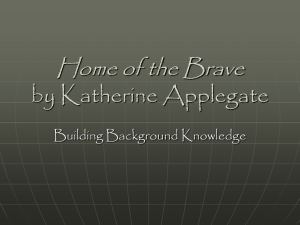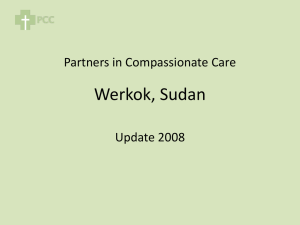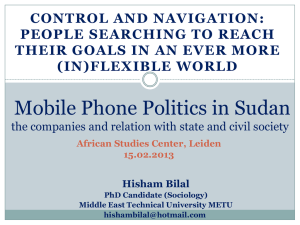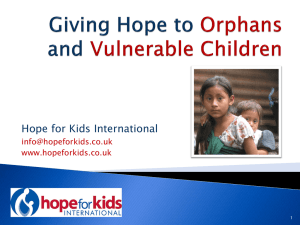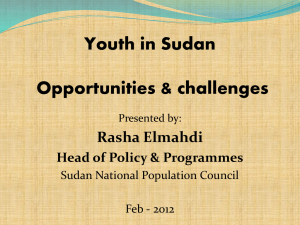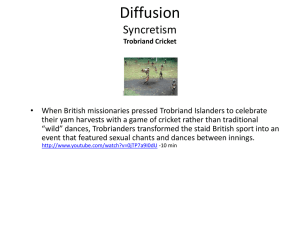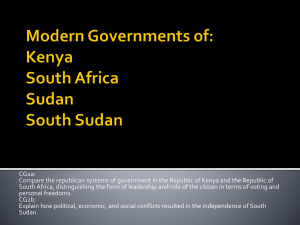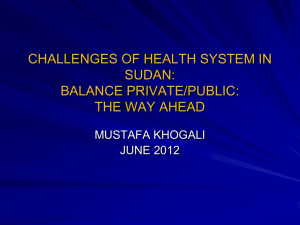A/HRC/29/L.8 - Office of the High Commissioner on Human Rights
advertisement
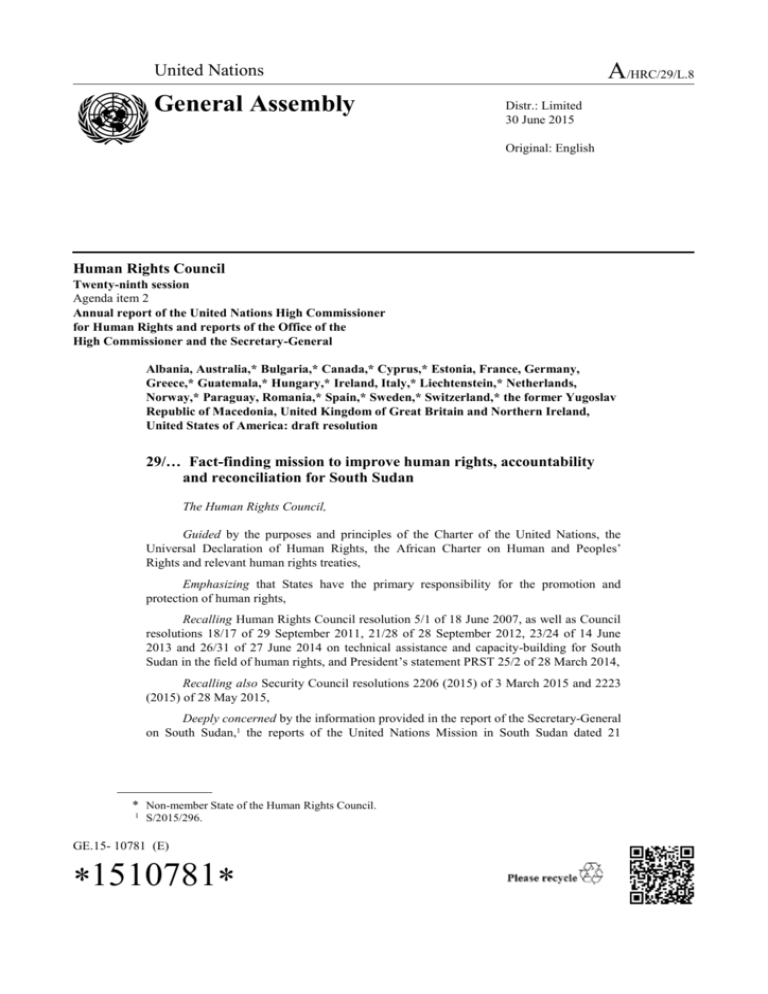
A/HRC/29/L.8 United Nations General Assembly Distr.: Limited 30 June 2015 Original: English Human Rights Council Twenty-ninth session Agenda item 2 Annual report of the United Nations High Commissioner for Human Rights and reports of the Office of the High Commissioner and the Secretary-General Albania, Australia,* Bulgaria,* Canada,* Cyprus,* Estonia, France, Germany, Greece,* Guatemala,* Hungary,* Ireland, Italy,* Liechtenstein,* Netherlands, Norway,* Paraguay, Romania,* Spain,* Sweden,* Switzerland,* the former Yugoslav Republic of Macedonia, United Kingdom of Great Britain and Northern Ireland, United States of America: draft resolution 29/… Fact-finding mission to improve human rights, accountability and reconciliation for South Sudan The Human Rights Council, Guided by the purposes and principles of the Charter of the United Nations, the Universal Declaration of Human Rights, the African Charter on Human and Peoplesʼ Rights and relevant human rights treaties, Emphasizing that States have the primary responsibility for the promotion and protection of human rights, Recalling Human Rights Council resolution 5/1 of 18 June 2007, as well as Council resolutions 18/17 of 29 September 2011, 21/28 of 28 September 2012, 23/24 of 14 June 2013 and 26/31 of 27 June 2014 on technical assistance and capacity-building for South Sudan in the field of human rights, and President’s statement PRST 25/2 of 28 March 2014, Recalling also Security Council resolutions 2206 (2015) of 3 March 2015 and 2223 (2015) of 28 May 2015, Deeply concerned by the information provided in the report of the Secretary-General on South Sudan,1 the reports of the United Nations Mission in South Sudan dated 21 * Non-member State of the Human Rights Council. 1 S/2015/296. GE.15- 10781 (E) A/HRC/29/L.8 February 2014, 8 May 2014, 19 December 2014 and 9 January 2015 and the report of the United Nations High Commissioner for Human Rights, 2 Deeply concerned also at the human rights situation in South Sudan and at reports of atrocities committed since the outbreak of violence on 15 December 2013, exacerbated by the recent upsurge in violent clashes, including targeted attacks on civilians and mass displacements, the recruitment and use of children and attacks on schools and hospitals in violation of applicable international law, widespread incidents of arbitrary arrest and detention and sexual violence, and deeply concerned further that the conflict has resulted in great human suffering, including significant loss of life, the displacement of more than two million people and the loss of property, further impoverishing and disadvantaging the people of South Sudan, Expressing grave concern that, according to the report of the United Nations Mission in South Sudan of 8 May 2014, there are reasonable grounds to believe that crimes against humanity and war crimes have been committed, Deeply concerned by the violence against children outlined in the press release of the United Nations Children’s Fund dated 17 June 2015, in which the Executive Director of the Fund stated that as many as 129 children from Unity state had been killed during three weeks in May, that survivors had reported that boys had been castrated and left to bleed to death, that girls as young as 8 years of age had been gang raped and murdered, that children had been tied together before their attackers slit their throats and that others had been thrown into burning buildings, Expressing particular concern at the increasing reduction of the democratic space in South Sudan, including through restrictions on the exercise of the human rights to freedoms of expression, peaceful assembly and association and limitations on the operation of civil society and the media, including arbitrary detention, harassment, use of excessive force and reported torture, Emphasizing that persistent barriers to the implementation of Security Council resolution 1325 (2000) of 31 October 2000 will only be dismantled through dedicated commitment to women’s empowerment, participation and human rights and through concerted leadership, consistent information and action and support to build women’s engagement at all levels of decision-making, Welcoming the leading mediation efforts of the Intergovernmental Authority on Development and the contribution of the African Union, encouraging renewed regional and international efforts to implement swiftly a comprehensive solution to end the crisis in South Sudan, and urging all parties to engage meaningfully in the peace process to bring about a political resolution to the crisis and an end to the violence, Recognizing the critical work of the Human Rights Division of the United Nations Mission in South Sudan, Expressing concern that the situation in South Sudan continues to be characterized by generalized impunity, Welcoming the establishment and work of the African Union Commission of Inquiry on South Sudan and stressing the importance of thorough and genuine investigations into all human rights violations and abuses and violations of international humanitarian law with a view to bringing perpetrators to justice, and underlining the role that regional, domestic 2 2 A/HRC/28/49. A/HRC/29/L.8 and international accountability mechanisms, including possible hybrid courts, have to play in ensuring accountability, Welcoming also the communiqué dated 13 June 2015 of the African Union Peace and Security Commission, and the plans of the Commission to consider the final report of the African Union Commission of Inquiry on South Sudan at a meeting in July 2015, anticipating with interest the findings and recommendations of the Commission of Inquiry, and encouraging the public release of its final report as soon as possible, Taking note of the conclusions on children and armed conflict in South Sudan,3 adopted by the Security Council Working Group on Children and Armed Conflict on 8 May 2015, welcoming the ratification by South Sudan of the Convention on the Rights of the Child, and calling for its swift implementation, 1. Expresses grave concern at the ongoing human rights violations and abuses and violations of international humanitarian law in South Sudan, including those involving extrajudicial killings, targeted violence on the basis of tribal or ethnic affiliation, rape and other forms of sexual and gender-based violence, the recruitment and use of children, enforced disappearances, arbitrary arrests and detention, the arbitrary denial of humanitarian access, violence aimed at spreading terror among the civilian population and attacks on schools, places of worship, hospitals and United Nations and associated peacekeeping personnel, by all parties of this man-made conflict, including armed groups and national security forces, and the incitement to commit such abuses and violations, condemns harassment and violence directed at civil society, humanitarian personnel and journalists, and emphasizes that those responsible for violations and abuses of human rights and violations of international humanitarian law must be held accountable; 2. Demands a halt by all actors to all human rights violations and abuses and all violations of international humanitarian law, and strongly calls upon the Government of South Sudan to ensure the protection and promotion of human rights, especially for the most marginalized members of society, in particular women and children; 3. Stresses the importance of accountability, reconciliation and healing as prominent elements of a transitional agenda, and also stresses that perpetrators of violations of international humanitarian law and human rights violations and abuses, including those that may constitute serious international crimes, should be held accountable and brought to justice; 4. Calls upon the Government of South Sudan to investigate and report on atrocities, including human rights violations and abuses and violations of international humanitarian law, and to hold those responsible to account while affording fair trial protections and supporting survivors; 5. Underscores the importance of the swift public release of the final report of the African Union Commission of Inquiry on South Sudan and consideration of the Commission’s findings and recommendations; 6. Recognizes the importance of independent and public human rights monitoring, investigation and reporting for their useful role in laying the groundwork for justice, accountability, reconciliation and healing among members of all South Sudanese communities; 7. Urges all parties to respect and implement the agreements mediated by the Intergovernmental Authority on Development and to commit to inclusive dialogue, 3 S/AC.51/2015/1. 3 A/HRC/29/L.8 reconciliation and peacebuilding, notes with concern that, since the signing of the Cessation of Hostilities Agreement in January 2014, breaches have continued from both sides of the conflict, calls for the Agreement to be respected and for all fighting to cease, and urges the parties to reach a peace agreement to end the conflict; 8. Calls upon the international community to help those neighbouring countries hosting refugees, especially women, children and persons with disabilities; 9. Urges the Government of South Sudan to take immediate steps to protect the human rights to freedoms of expression, peaceful assembly and association by, among other things, ensuring that civil society organizations and the media can operate freely and without discrimination, including by ensuring that no unduly restrictive laws for civil society or the media are enacted, and also urges the Government to act in accordance with its international human rights obligations; 10. Strongly urges the Government of South Sudan to fully and immediately implement its revised action plan to end and prevent violations committed against children, also strongly urges the Sudan People’s Liberation Movement/Army in opposition to fully and immediately implement their commitment to end violations and abuses against children signed on 10 May 2014, calls upon all armed forces to end immediately all forced or unlawful recruitment of children and to release all children that have been recruited to date, notes the national launch on 29 October 2014 of the campaign entitled “Children, not soldiers” by the Government, welcomes the release of children by the Cobra faction of the South Sudan Democratic Movement/Army, and urges the Government to accede to the Optional Protocol to the Convention on the Rights of the Child on the involvement of children in armed conflict; 11. Recognizes the important role that women play in building peace, calls for the protection and promotion of women’s rights, their empowerment and participation in peacebuilding, conflict-resolution and post-conflict processes, in accordance with Security Council resolution 1325 (2000), and recognizes the need to honour commitments made by all parties and to take action to tackle sexual violence, and in this regard calls upon South Sudan to meet the commitments from the joint communiqué of 11 October 2014 of the Government of South Sudan and the United Nations on addressing conflict-related sexual violence; 12. Reiterates the importance of demonstrating the continued serious concern of the international community about the human rights situation in South Sudan by the establishment of a follow-up mechanism to sustain an objective focus on the human rights situation; 13. Rights: Requests the Office of the United Nations High Commissioner for Human (a) To monitor, report and make recommendations on alleged human rights violations, abuses and related crimes in South Sudan; (b) To undertake a fact-finding mission and comprehensive investigation into alleged serious violations and abuses of human rights in South Sudan and related crimes, and to establish the facts and circumstances of such alleged violations, abuses and related crimes perpetrated with a view to avoiding impunity and ensuring accountability; (c) To engage the Government of South Sudan and other relevant parties, to incorporate a gender perspective and to consider a full range of information, including from relevant human rights mechanisms, in particular with the Human Rights Division of the United Nations Mission in South Sudan and relevant civil society entities in the implementation of the present resolution with a view to helping the country to fulfil its human rights obligations; 4 A/HRC/29/L.8 (d) To support domestic, regional and international efforts towards accountability, reconciliation and other transitional justice measures, including through recommendations concerning appropriate technical assistance, taking into consideration the findings and recommendations of the final report of the African Union Commission of Inquiry for South Sudan and other regional and international efforts to identify accountability mechanisms; 14. Further requests the Office of the High Commissioner, in implementing the provisions of paragraph 13 above: (a) To assess the effectiveness of steps taken by the Government of South Sudan to ensure accountability for human rights violations and abuses, which could include work to establish a hybrid court or other criminal justice mechanisms, to decrease and prevent violence against children and the recruitment of child soldiers, to investigate, arrest and prosecute perpetrators of sexual violence, including those in armed groups and the military, to investigate, arrest and prosecute perpetrators of extrajudicial killing, to increase the democratic space, especially for the media and civil society, and to prevent arbitrary detention; (b) To recommend, on the basis of these assessments, the appropriate follow-up for the Human Rights Council to consider, including consideration of the appointment of a special rapporteur and consideration of the appropriate technical assistance; 15. Calls upon the Government of South Sudan to cooperate fully with the Office of the High Commissioner in the implementation of the present resolution, including by facilitating visits and access to the country and by providing relevant information, 16. Encourages the Office of the High Commissioner and relevant special procedures mandate holders to provide, in consultation with the Government of South Sudan, advice and technical assistance on implementing the present resolution; 17. Calls upon the Government of South Sudan to cooperate constructively with the United Nations, including the United Nations Mission in South Sudan, 18. Requests the Office of the High Commissioner to present to the Human Rights Council at its thirtieth session a preliminary oral report and to present a full report to the Council at its thirty-first session in an interactive dialogue, including on the issue of sexual violence; 19. Requests that the Office of the High Commissioner provide all necessary and appropriate resources to implement the present resolution, 20. Decides to remain seized of the situation in South Sudan and to examine the conclusions of the Office of the High Commissioner called for in paragraphs 13 and 14 above in order to determine the appropriateness of creating a special rapporteur on the situation of human rights in South Sudan. 5
